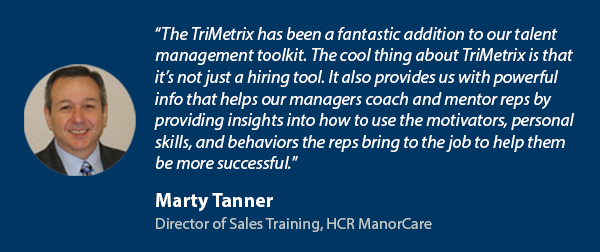Giving and receiving productive feedback is key to the personal and professional development of your employees.
A feedback culture is one in which employees and leaders regularly, consistently, and productively engage in useful feedback that fosters growth.
Sales teams that invest in a growth-oriented feedback culture outperform companies that fail to make feedback and coaching a priority.
Here are 7 tips for developing a feedback culture on your sales team.
1. Establish Trust
Some managers may have good intentions when they give constructive criticism or corrective feedback to their team members, but unless there’s a high level of trust established among the team, the feedback can be taken negatively.
Perception is reality, so if a member of the sales team perceives the feedback as threatening or demeaning, they’re less likely to use it to improve their performance.
For this reason, it’s critical that you establish trust with your team before attempting to provide or encourage feedback. They need to know that they can rely on you and that you have their best interests at heart before they will be ready to engage with productive feedback.
2. Nurture a Growth Mindset
Brain research has established that there are two basic brain mindsets when it comes to learning: A fixed mindset or a growth mindset. People with a fixed mindset believe that success comes primarily from innate talent.
These people tend to react to constructive feedback with defensiveness rather than an effort to understand, because they experience the feedback as criticism of who they are rather than an effort to help them improve.
A growth mindset, on the contrary, means that the person believes that success comes primarily from effort and learned skills. A person with a growth mindset will naturally be more coachable than one with a fixed mindset.
You can nurture a growth mindset on your team by rewarding effort, behavior, progress, and learning, and by praising those qualities rather than focusing on talent or pure performance.
You should also take strides to hire new sales reps that have a coachable attitude. The most effective ways to determine that is through targeted interview questions, and the use of a comprehensive personal assessment.
3. Establish Systems for Consistent Feedback
Performance reviews shouldn’t be the only time salespeople hear feedback. Work to develop a coaching culture by making the feedback process part of the team’s routine.
Whether your reps are receiving feedback at team meetings, during one-to-ones, after joint calls, or during scheduled performance reviews, it should be something they come to expect.
Communicate that feedback can and should occur throughout the week as it is necessary and appropriate.
4. Engage in Meaningful Positive Feedback
Common wisdom says to “sandwich” constructive criticism between positive feedback. While the advice is well-intended, the reality is that this can make the positive feedback sound hollow to the recipient, who understands that it’s there merely as a cushion for the “negative” feedback.
Instead, focus on providing positive feedback regularly and independently of corrective feedback.
Remember that feedback is more meaningful when it’s specific. Focus on each salesperson’s unique strengths and areas of growth, as well as the particular actions that you want to reinforce.
5. Train Managers and Coaches to Provide Productive Feedback
It’s crucial that your sales managers are providing good feedback, but coaching isn’t something that comes naturally for everyone—it’s a learned skill.
An effective sales coach understands their team members and adapts their approach to match the communication preference of each individual.
A comprehensive personal assessment tool can provide that insight to managers, and give them specific guidelines for providing feedback and getting the greatest impact from their coaching time.
Here’s what one of The Brooks Group’s long-time assessment users has to say about the tool:

Learn more about Brooks Talent Index and how you can try the tool for free here.
6. Equip Employees to Provide Their Own Feedback
A great feedback culture isn’t just about salespeople learning from feedback. It’s also about salespeople providing feedback to each other, to their coaches, and to the leadership, in meaningful and productive ways.
Teach employees how to provide good feedback to others, and make your culture a safe place for them to do that.
A tool like TINYpulse is great for gathering anonymous feedback from employees, and it’s something we’ve found extremely helpful here at The Brooks Group.
7. Coach Employees How to Receive Feedback
Teach employees that feedback is intended to help them improve, and that they should expect it regularly even when their performance is good. They need to know that corrective feedback is not a personal criticism, but a way to help them grow.
Over time your sales reps will actually begin to crave this coaching.
Our VP of Sales likes to tell the story of a new rep who was initially resistant to corrective feedback during their one-to-one coaching sessions. Over time, because the feedback was delivered consistently and within a productive feedback culture, the rep came to expect it.
Eventually, she even came to crave it. If the VP of Sales failed to offer it on occasion or stated that the rep had performed flawlessly, the rep would say, “Come on, there’s nothing, really?”
When your employees request constructive feedback, you know that you have successfully established a productive feedback culture.
Conclusion
Coaching and feedback are crucial to building a high-performance culture within your sales team. But what many companies fail to recognize, is that coaches need their own coaching to be effective.
The Sales Management Symposium demystifies sales coaching, and gives sales managers a practical guide for building and leading an elite sales team. Learn more about the Symposium and register for an upcoming event here.
NOTE: Our sales training tools are designed to make your life easier. Use them to your advantage.
Finding and Keeping Top Sales Talent
There’s nothing more critical to the success of your business than your people. Forward-thinking sales organizations make talent their competitive advantage by acquiring, developing, and retaining top sales talent for the needs of both today and tomorrow.




